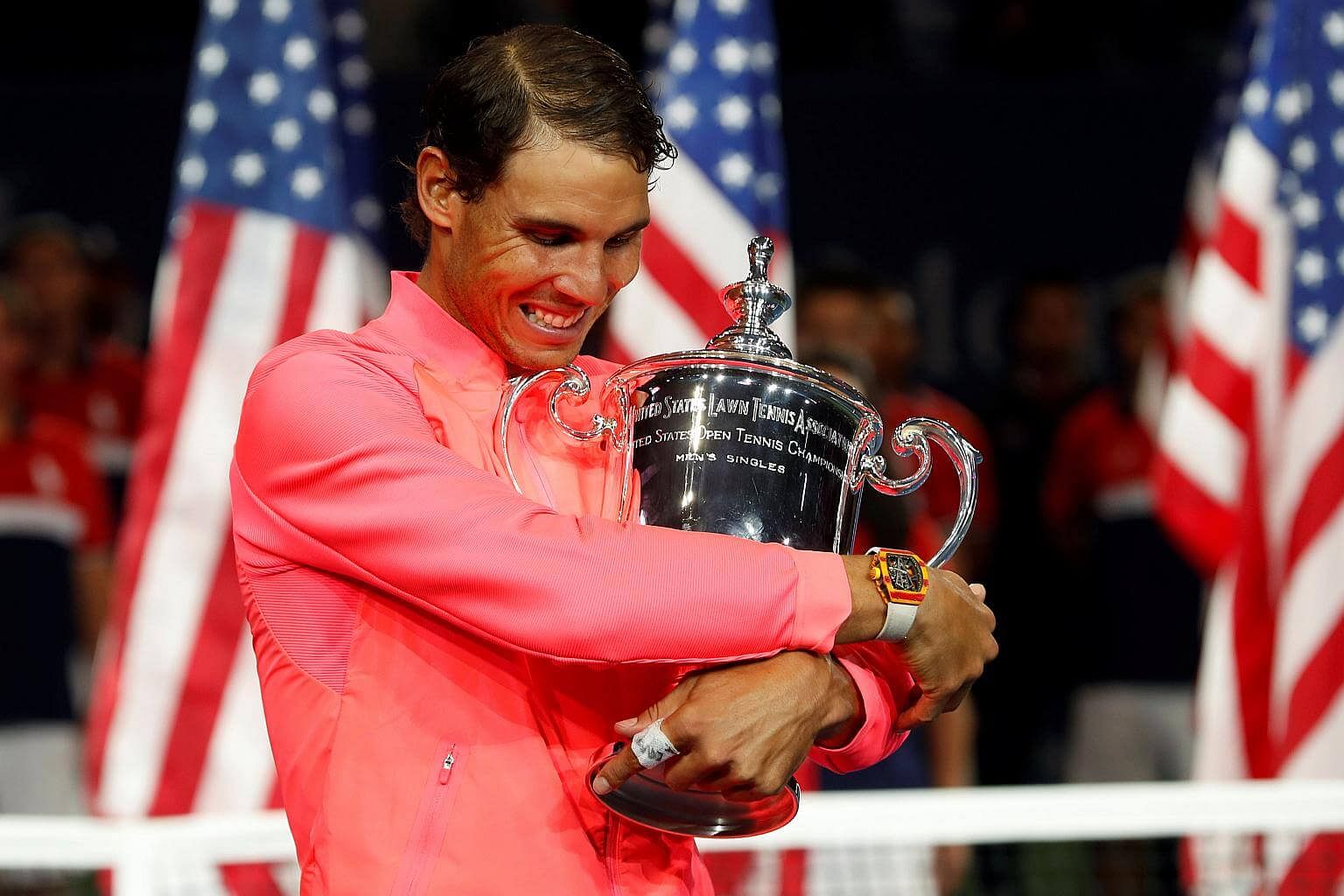You can try many things with Rafael Nadal. You can try prayer, hexes, shamans, stares, rain dances, coughing while he serves and knocking over his water bottle. But you've seen his implacable face. Probably won't work.
You can try to carefully build a plan to unsettle and unseat him at the US Open, though as Mike Tyson once said "everyone has a plan till they get hit". Indeed, everyone - theoretically - can find a chink in Nadal's armour, till they actually start playing Nadal. And then the whole idea of weakness changes meaning.
You can try, for instance, to work his backhand, which is apparently not as refined a weapon. Till he strikes, as he did on Sunday evening, three of four passing shots off that backhand side. OK then, maybe not a weakness.
You can try and convince yourself that Nadal is a technically unsound volleyer, no protege of Edberg the Magnificent or cousin of Cash the Athletic. Yet he wins 16 of 16 points at the net in the final. It's 13 years since his first Grand Slam title and shouldn't he be deteriorating? At least a little?
Still, opponents have to try.
You can try, for example, to get ready for him by warming up with a leftie. Just, you know, to get the angles sorted out. Familiarity, you understand. But you know any lefties on this planet who do geometry like Nadal? Didn't think so.
You can try and unsettle him by playing a little serve and volley because anyway he is camped so far behind the baseline he's almost in another borough, except in the fifth game, off balance (what else), the Spaniard hits a forehand down-the-line winner with Kevin Anderson at the net. Already a rival must think, where do I have to go? Which geography of this court is safe?
You can try to dominate because who wants to rally against The Great Moving Wall of Manacor and two days earlier the humble, gritty Anderson, a terrific revival story in his own right, said: "I really need to be dominant and control proceedings as much as possible."

This has to start with the 2.03m South African's Sidewinder missile serve and he's laid down 114 aces in six previous matches, which is 19 per match, but in the final produces only 10. He's also served an average of 65 per cent of first serves in the tournament but in the final falls to 59.
It could be the nerves of a first Grand Slam final, but it could also be Nadal who subconsciously asks rivals to try and serve better than they ever have. And when they do hit them well, he reads them like a savant in shorts and as Anderson said: "Rafa made it very difficult for me tonight. I felt he got a lot of returns back. He varied his return position quite a lot. You know, one of the best defenders in our sport." And so, suddenly, after facing eight break points in total in his previous three matches, the South African is confronted with four break points in his first three service games. It must be hard to breathe.
You can try and shorten the rallies against Nadal, avoid sweaty conversations by muscling big shots, aiming for the lines, making him doubt, and if you go through history it's happened before, well, here and there, about as often as a total solar eclipse.
Except Anderson's second service game goes 18 points and his next one lasts 16 points and the first seven games will take 47 minutes. Nothing is short, nothing is easy, nothing is quick, for Nadal is tennis' greatest miser, he won't give you a single point if he doesn't have to. As the South African put it: "He never goes away."
Anderson's intent is clear and some of his shot-making is sublime as he swings freely at the ball except Nadal clearly has longer arms than anyone on the planet, and absurdly fast feet, and is more committed than a young priest. He asks too many shots of Anderson and too much perfection till the South African, who makes 45 and 43 unforced errors in his last two four-set matches respectively, now makes 40 in 28 games. "I thought I was hitting the ball very well," explained Anderson. "It was more the conundrum of playing Rafa as opposed to being in my first final."
Anderson played honourably and bravely and stirred his great sporting nation but when Nadal is in this mood nothing will work. Except, maybe, his Swiss pal at full fitness. You might try and say Roger Federer is too far ahead in the Grand Slam title race with 19 but only a goat, in lower case, would bet Nadal, with 16, will not get there.
The Spaniard is not just just No. 1 but the world's greatest destroyer of sporting obituaries. He's running on those same knees we said would never last, is five years younger than Federer, is ironically a still-standing hero in an injury-wrecked tennis universe, and continues to ply his trade with a familiar integrity.
Anderson, generous in his praise, elegantly analysed Nadal's mindset later and said: "A lot of guys, you might see them get angry at a line call and suddenly they start playing better tennis". But Nadal, he continued, never requires an external factor to drive him to play better. He simply "brings that high energy every single point".
What Anderson was telling us was that all these years later, for every shot and every rally, Nadal remains a threat because he's dedicated to the one idea and the one word that sustains him:
Try.


